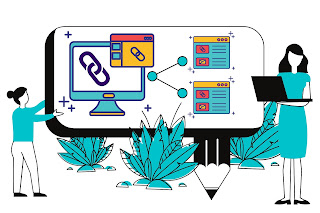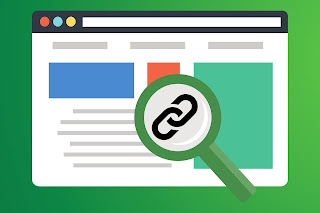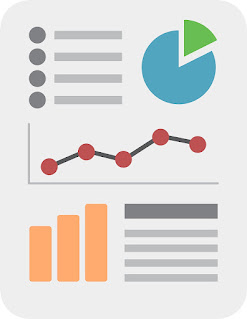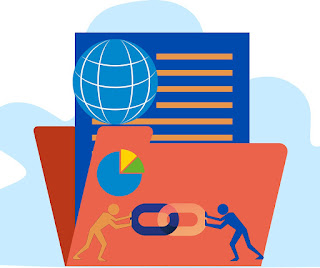You need to do SEO (Search engine optimization) for higher
SERP ranking to increase traffic to your website. This post focuses on off-page optimization, one of the most crucial SEO tactics. Off-page SEO
describes activities that take place off of your website but have the potential
to impact its ranking. To put it another way, it refers to the act of enhancing
your online exposure through the use of outside resources like social networks,
backlinks, and local SEO. Because it aids search engines in recognizing the
significance of your website, off-page SEO is essential to SEO.
In this article, we'll explore the importance of off-page SEO and provide guidance on how you can improve your website's ranking through off-page optimization. This article is designed for beginner-level users who want to understand off-page SEO and how to implement it to improve their website's ranking in SERPs.
The most significant off-page SEO component, backlinks can influence a website's search engine rating by up to 50%. (Moz)
Social media optimization is essential to off-page SEO because 94% of content authors utilize social media to promote their material. (HubSpot)
A website's likelihood of appearing on the first page of Google search results increases by 12 times for those with a strong backlink profile (i.e., many high-quality backlinks). (Moz)
60% of bloggers report success from their efforts at guest blogging, making it an excellent off-page SEO technique. (OptinMonster)
By generating up to 12% more traffic than websites without infographics, infographics are a powerful tool for constructing backlinks. (HubSpot)
A website's domain authority can be considerably increased through high-quality backlinks, and websites with a high domain authority appear higher in search engine results. (Ahrefs)
According to 88% of businesses, content marketing is a crucial part of their digital marketing strategy, and off-page SEO tactics like guest blogging and social media optimization are crucial parts of it. by the Content Marketing Institute
Search engine results in page favor websites with a lot of social media shares (also known as social signals). (Moz)
53.3% of visits to the average website come from organic searches, underscoring the significance of off-page SEO in generating organic search traffic. (BrightEdge)
Building local citations and claiming a Google My Business listing are two essential local off-page SEO methods.
What is Off-Page SEO?
A. Definition of Off-page SEO:
Off-page SEO describes the activities carried out off your
website that may affect its visibility and positioning in search engine results
pages (SERPs). This covers techniques like guest blogging, local SEO, link
building, and social media marketing. By enhancing your website's authority,
relevance, and popularity among search engines, these off-page activities can
help your website rank better in SERPs.
B. Comparison with On-page SEO:
On-page SEO refers to optimizing website content, structure,
and HTML code. Its focuses on making the website more friendly user, relevant, and
engaging. On the other hand, off-page SEO focuses on building website authority and
reputation through external channels.
On-page SEO is important for ensuring a website is optimized for
search engine crawlers and user experience, but off-page SEO plays a critical role
in determining how search engines rank a website.
C. Explanation of why off-page SEO is important:
Because it demonstrates to search engines that your website
is current, reliable, and well-liked, off-page SEO is crucial. Search engines
view backlinks from other websites as endorsements of the authority and content
of your website. Your website is more likely to rank higher in SERPs the more
high-quality links it has.
Establishing your brand's online presence and reputation
requires off-page SEO as well. You may connect with more people by using local
SEO, guest blogging, and social media marketing to expand your audience.
Ultimately, off-page SEO is crucial for increasing your
website's exposure, reputation, and authority. These factors can result in more
organic traffic, improved conversion rates, and eventually, increased business
growth.
Types of Offenses that Encourage Movement
A. Backlinks:
- Definition
of Backlinks:
Backlinks are connections that other websites make to your
website. These links may also be called incoming links, external links, or
inbound links. Backlinks are a crucial component of off-page SEO because they
tell search engines that other websites think your content is interesting and
relevant.
- Importance
of Backlinks for SEO:
Backlinks are among the most crucial elements in figuring
out how high up in the SERPs your website will appear. Search engines like Google see backlinks as endorsements of your website's authority and content. Your website is more likely to rank higher in SERPs if it has more
backlinks of high quality.
- How to
Obtain Backlinks:
There are several ways to obtain backlinks, including:
- Guest
blogging: Writing high-quality content for other websites in exchange for
a link back to your website.
- Broken
link building: Finding broken links on other websites and suggesting your
content as a replacement.
- Building
relationships with other websites in your niche and asking for a backlink.
- Creating
high-quality, shareable content that naturally attracts backlinks.
B. Social Media:
- Importance
of Social Media for SEO:
Social media can indirectly impact your website's ranking in
SERPs by increasing your online presence, visibility, and engagement. Social
media platforms like Facebook, Twitter, LinkedIn, and Instagram can help you
reach a wider audience and build relationships with potential customers.
- How
to Use Social Media for SEO:
To use social media for SEO, you can:
- Share
your blog posts, articles, and other content on social media platforms.
- Engage
with your followers by responding to comments, answering questions, and
sharing relevant content.
- Build
relationships with influencers in your niche and ask them to share your
content.
- Use
hashtags and keywords to increase the visibility of your social media
posts.
C. Local SEO:
- Importance
of Local SEO for Small Businesses:
The technique of optimizing your website for local search
queries is known as local SEO. The ability to contact local clients who are
looking for their goods or services makes local SEO crucial for small
businesses. Small businesses may compete with local, bigger corporations with
the use of local SEO.
2. How
to Improve Local SEO:
To improve your website's local SEO, you can:
- Optimize
your Google My Business profile with accurate information about your
business.
- Use
location-based keywords in your content and meta tags.
- Build
local citations by getting listed in local directories and review
websites.
- Encourage online reviews from satisfied customers.
Specific Examples of Off-Page SEO
A. Link Building Strategies:
- Guest
Posting:
Writing excellent material for
other websites in exchange for a link back to your website is known as guest
posting. A wonderful technique to develop backlinks and improve your internet
presence is guest posting. Selecting websites with a high domain authority
that are pertinent to your niche is crucial when guest posting.
- Broken
Link Building:
Broken link building involves finding broken links on other websites and suggesting your content as a replacement. Broken link building is a great way to get high-quality backlinks because you are helping the website owner fix a problem on their site while also promoting your own content.
- Resource
Page Link Building:
Finding websites with resource pages relevant to your
specialty and presenting your material as a useful resource to be featured on
the page are both components of resource page link development. This is a
fantastic strategy to gain backlinks from high-quality websites and raise your
internet exposure.
B. Social Media Marketing:
- Content
Marketing on Social Media:
To draw in and keep the attention of your target
audience on social media, content marketing entails producing and publishing
high-quality material. Infographics, videos, blog articles, and other content
are examples of this. You may strengthen your connections with your followers
and improve your online exposure by publishing relevant material.
- Engaging
with Followers on Social Media:
Responding to comments, addressing inquiries, and sharing
pertinent content are all part of social media engagement. You may develop
connections with your followers, raise engagement levels, and eventually
enhance website traffic by interacting with them.
C. Local SEO:
- Claiming
Google My Business Listings:
The first step to enhancing your local SEO is to claim your
Google My Business listing. The address, phone number, and business hours are
all prominently shown in your Google My Business listing. Your internet
presence can be increased and you can draw in more nearby clients by boosting
your Google My Business listing.
- Building
Local Citations:
Being featured in local directories and review websites is a
part of developing local citations. This is crucial for boosting your local SEO
since it tells search engines that your company is reliable and relevant in
your neighborhood. You can add your company to sites like Yelp, Yellow Pages,
and TripAdvisor to establish local citations.
Specific Drills coaches Can Rum to Encourage Movement
A. Conducting a Backlink Audit:
One drill coaches can run to encourage movement is to
conduct a backlink audit. This involves analyzing your website's backlink
profile to identify any low-quality or spammy links that could be harming your
SEO. Once you have identified these links, you can take steps to disavow them
and improve your backlink profile.
B. Setting up Google Analytics and Google Search Console:
Installing Google Analytics and Google Search Console on their
website is another exercise that coaches may do. These tools can assist in
understanding the better performance of your website, displaying the user's
search queries, the most frequently visited pages, and your traffic sources. By
analyzing this information, you can determine your off-page SEO tactics.
C. Analyzing Competitors' Off-page SEO Strategies:
Finally, coaches can analyze their competitors' off-page SEO
strategies to identify areas where they can improve. This involves researching
your competitor's backlink profiles, social media presence, and local SEO
efforts. By analyzing your competitors' strategies, you can identify new
opportunities for link-building, social media marketing, and local SEO that you
may have overlooked.
Conclusion
Any effective SEO strategy must include off-page SEO as a
key element. You may raise your website's search engine ranks and increase
traffic by creating high-quality backlinks, utilizing social media, and optimizing
for local search.
A newbie must fully understand the foundations of off-page
SEO and how it differs from on-page SEO. There are many strategies you may use
to improve your off-page SEO efforts. Backlinks, social media, and local SEO
are all essential components.
It's crucial to start concentrating on your off-page SEO
activities right away if you're just starting with SEO. You can start
constructing high-quality backlinks, utilizing social media, and optimizing for
local search by using the techniques described in this article to boost your
website's search engine rankings and increase traffic. You may significantly
increase your website's search engine performance and general internet
visibility with some time and effort.
FAQs
Q1. What is the difference between on-page and off-page SEO?
A: On-page SEO, also known as content and meta tag optimization, describes changes made directly to the website for raising its search engine ranks while off-page SEO refers to various forms that can also affect a website's search engines rankings like constructing high-quality backlinks, social media marketing, and local SEO.
Q2. How important is off-page SEO for improving search
engine rankings?
A: Off-page SEO is an essential component of any successful
SEO strategy. Using social media, optimizing for local search, and constructing
high-quality backlinks can all considerably raise a website's search engine
results and increase visitors.
Q3. What are some effective link-building strategies for
off-page SEO?
A: Some effective link-building strategies for off-page SEO include guest posting, broken link building, and resource page link building.
Q4. How can I improve my local SEO?
A: To improve your local SEO, you can start by claiming your Google My Business listing, building local citations, and optimizing your website for local keywords.
Q5. How can I analyze my off-page SEO performance?
A: To analyze your off-page SEO performance, you can conduct a backlink audit, set up Google Analytics and Google Search Console, and analyze your competitors' off-page SEO strategies. These steps can help you identify areas where you can improve and refine your off-page SEO efforts.
Related Articles:









0 Comments